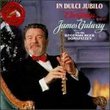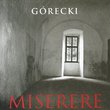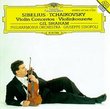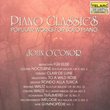| All Artists: Alessandro Scarlatti, Roberta Invernizzi, Veronique Gens, Vivica Genaux, Fabio Biondi, Europa Galante Paul Agnew Roberto Abbondanza Title: Scarlatti: La Santissima Trinit� Members Wishing: 0 Total Copies: 0 Label: Virgin Veritas Release Date: 6/1/2004 Genre: Classical Styles: Opera & Classical Vocal, Historical Periods, Baroque (c.1600-1750) Number of Discs: 1 SwapaCD Credits: 1 UPCs: 724354566622, 724354566653 |
Search - Alessandro Scarlatti, Roberta Invernizzi, Veronique Gens :: Scarlatti: La Santissima Trinit�
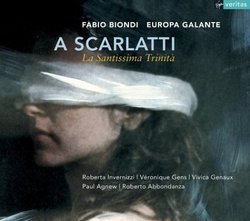 | Alessandro Scarlatti, Roberta Invernizzi, Veronique Gens Scarlatti: La Santissima Trinit� Genre: Classical
|
Larger Image |
CD DetailsSimilarly Requested CDs
|
CD ReviewsSumptuous! John Arlom | Canberra, ACT, Australia | 08/28/2004 (5 out of 5 stars) "Alessandro Scarlatti was a leading composer in the Italian vocal tradition of the late seventeenth century and early next. As Biondi's excellent background notes state, in recording some words of the composer to his Florentine patron, "Your Highness will find in this music, both liveliness and everything that is most easy, with no trace of melancholy." And these few words capture much of what needs to be said of this oratorio. While Biondi goes on to point out that Scarlatti's church compositions, of which little is known, were the finest that he produced, and indeed perhaps the finest in this style of music. This is indeed happy music, free of the "vulgarity" of Vivaldi's appealing rhythms and pervaded with a sensitivity and gentleness throughout every bar of the piece. The string playing of the Europa Galante under Biondi's direction, is beautifully matched with this Scarlatti style and is both rich in tone and never overpowering the splendid soloists. Overall it is beguilling music and recorded with lovely sound and a sound stage, which gives no hint of the magnificent edifice in which it is recorded - Notre Dame in Paris. A very happy purchase, the booklet of which includes a full libretto (in four languages), and detail even of the maker of each period instrument. " How very odd! Giordano Bruno | Wherever I am, I am. | 11/02/2007 (5 out of 5 stars) "How very odd the reviews on amazon can be! The four previous reviewers have all rhapsodized about the beauties of this performance, and I completely agree. One reviewer seemed to think that Domenico and Alessandro were the same person; they weren't. None of the reviews mention that "La Santissima Trinita" is a dramatic cantata, an "opera" on the steps to the altar so to speak, in which the characters are Faith, Doubt, Theology, Time, and Divine Love, all disputing in recitativo and aria the plausibility of the concept of a trinitarian god. Happily for Scarlatti's well-being in the land of the Inquisition, Faith wins. Fabio Biondi, the director of this performance, is easily my favorite Italian Baroque fiddler. (It's a privilege of our multi-musical era to be able to ponder the merits of such great fiddlers as Biondi, Manze, Goebel, Huggett.) This performance, with Europa Galante expanded to 19 musicians, belongs to the singers. All five singers are excellent in themselves, and excellent in ensemble; that is, they all sing in the same period-appropriate manner, ornamenting and phrasing and using their voice colors in such accord that the 49 separate recitativos and arias hang together in a musically dramatic unity. I'm planning to keep my eyes open for other performances by Roberta Invernizzi and Roberto Abbondanza, whose clear rich basso fulfills the promise of his surname. Don't be discouraged by the intellectual subject of this cantata, or by Scarlatti's reputation as a cerebral composer. The music of La Santissima Trinita is anything but heavy or dark. Rather it's full of wit and invention, and fleeting Italianate musical smiles. Maximum recommendation! Five times five stars!" Untouchable, penultimate A. Scarlatti oratorio John Sandow | Chicago | 07/10/2007 (5 out of 5 stars) "Ferrari, Amati, Scarlatti... Italian classics. And now Biondi- Fabio Biondi leader of the ensemble Europa Galante- has re-created one of Allesandro Scarlatti's last oratorios. Perhaps the father of the father of the modern keyboard technique (Dominico Scarlatti) was feeling brave when he presented this work. Explorations into the meaning or essence the leader of the Catholic church & the Trinity ("God in three persons") were not common nor encouraged by the church at this time, but the master Scarlatti must have been in exceptional good graces.
It is not hard to imagine why, despite the fact the Europa Galante has outdone even themselves in this production, the celebration of the feelings of communinion with the maker and His supporting aspects shines through in the lyrics, the music, and the vocal and musical performances. When you read the libretto (4 languages, including Italian and English) along with the music, and can truly comprehend the meaning of the voices singing as if they were angels in heaven, it will truly move you to tears. This really surprised me, and continues to do so. This is early italian baroque at its best. Be advised that this CD might even cause you to start listen to opera! Roberta Invernizzi's voice hits beautiful resonances that still give me shivers after the 100th listening, and hearing her opposite Vivica Geneaux or Veronique Gens is truly a treat. Tracks 6 (Cieca Talpa), 28, and 37 showcase the ladies while the opening is a three (of course) part movement 'illustrating' three aspects of a grandly fine something indeed. As I said before, to tears. If you like baroque music at all, you will fall in love with this oratorio. If you do, then you will also like any of Europa Galante's recordings of either Vivaldi or either Scarlatti (A. or D.) -john sandow, 2007 " |

 Track Listings (49) - Disc #1
Track Listings (49) - Disc #1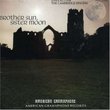

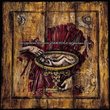


![Across The Universe [Deluxe Edition]](https://nationalbookswap.com/cd//m/51/1251/1241251.jpg)
